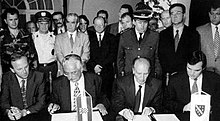| Declaration on implementation of the Washington Agreement, joint defence against Serb aggression and achievement of a political solution in accordance with the efforts of the international community | |
|---|---|
 Signing of the Split Agreement | |
| Signed | 22 July 1995 |
| Location | Split, Croatia |
| Mediators | Süleyman Demirel |
| Signatories | Franjo Tuđman, Alija Izetbegović, Krešimir Zubak, Haris Silajdžić |
| Parties | |
The Split Agreement or Split Declaration (Serbo-Croatian: Splitski sporazum or Splitska deklaracija) was a mutual defence agreement between Croatia, the Republic of Bosnia and Herzegovina and the Federation of Bosnia and Herzegovina, signed in Split, Croatia on 22 July 1995. It called on the Croatian Army (HV) to intervene militarily in Bosnia and Herzegovina, primarily in relieving the siege of Bihać.
The Split Agreement was a turning point in the Bosnian War as well as an important factor in the Croatian War of Independence. It led to a large-scale deployment of the HV in Bosnia and Herzegovina and the capture of strategic positions in Operation Summer '95. This in turn allowed the quick capture of Knin, the capital of the Republic of Serbian Krajina (RSK), and the lifting of the siege of Bihać soon thereafter, during Operation Storm. Subsequent HV offensives in Bosnia and Herzegovina, supported by the Army of the Republic of Bosnia and Herzegovina (ARBiH) and the Croatian Defence Council (HVO), as well as NATO air campaign in Bosnia and Herzegovina, shifted the military balance in the Bosnian War, contributing to the start of peace talks, leading to the Dayton Agreement.